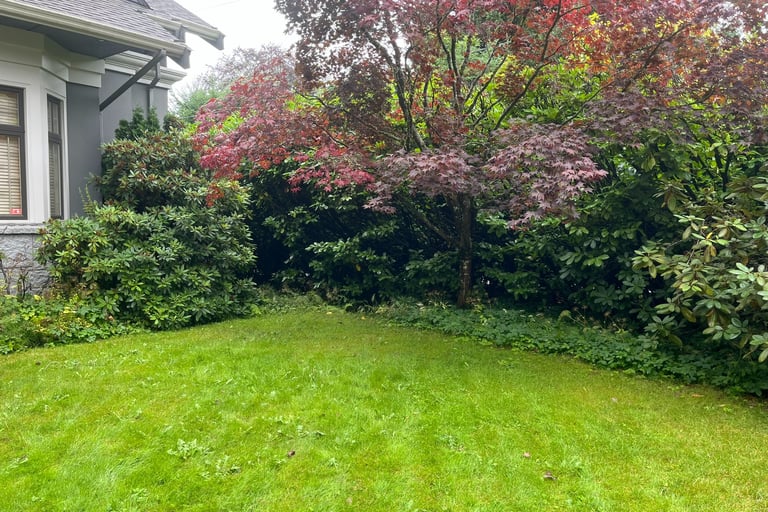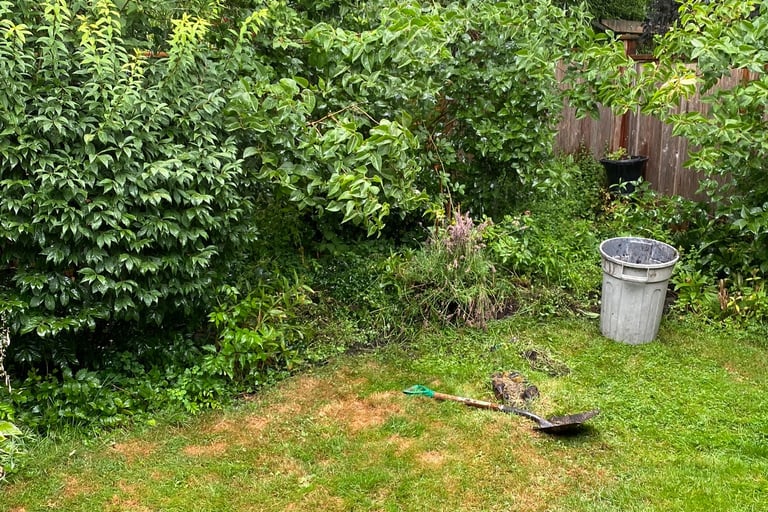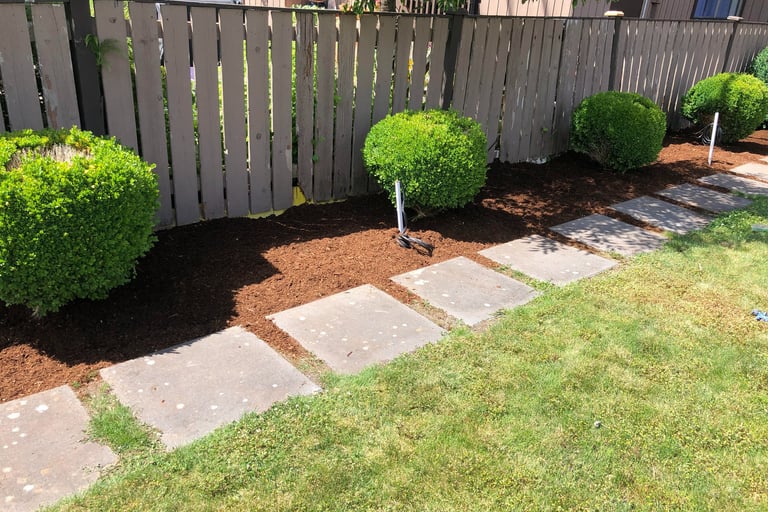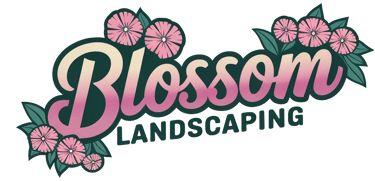
Creating Pet-Resistant Sod Areas in Vancouver Yards: A Complete Guide for Local Pet Owners
Learn how to create durable, pet-resistant sod areas in your Vancouver yard. Expert tips on grass selection, installation, and maintenance for our unique Pacific Northwest climate.
3/29/20256 min read
As a professional landscaper with over 15 years of experience working in Vancouver's unique climate, I've seen countless yards destroyed by beloved pets. The combination of our wet winters and active pets can quickly turn a lush lawn into a muddy mess. However, with proper planning and the right approach, it's entirely possible to maintain a beautiful yard that both you and your pets can enjoy.
Why Vancouver Yards Need Special Consideration
Vancouver's climate presents unique challenges when it comes to maintaining pet-friendly sod areas. With an average of 169 rainy days per year and extended periods of moisture between October and March, our lawns face different pressures than those in other Canadian cities. According to Environment Canada's historical data (check current statistics at Environment Canada's Weather Data), Vancouver receives approximately 1,189 mm of rainfall annually, making soil drainage and grass selection crucial factors.
Choosing the Right Sod for Vancouver Pet Owners
When selecting sod for a pet-friendly yard in Vancouver, durability and quick recovery are essential characteristics. Through years of local installation experience, I've found that certain grass varieties perform exceptionally well in our climate while standing up to pet traffic.
The Best Grass Types for Vancouver Pet Owners
Perennial Ryegrass Blend
This has consistently been my top recommendation for Vancouver pet owners. Its quick germination and exceptional wear tolerance make it ideal for our climate. You can find quality perennial ryegrass sod at local suppliers like Western Turf Farms in Delta, BC.
Tall Fescue
Another excellent choice for Vancouver yards, tall fescue offers superior resistance to dog urine and excellent drainage capabilities - crucial for our wet winters. Its deep root system helps prevent soil compaction, a common issue in areas where pets frequently run.
Kentucky Bluegrass Mixtures
While pure Kentucky Bluegrass can struggle with our shade and moisture levels, specially developed mixtures for the Pacific Northwest have shown excellent results in pet-heavy areas. Local suppliers like Premium Outlets Sod offer custom blends specifically designed for Vancouver's climate.
Preparing Your Yard for Pet-Resistant Sod
Proper preparation is crucial for success, especially given Vancouver's unique soil conditions. Our native soil tends to be clay-heavy in many areas, particularly in neighborhoods like Point Grey and Kitsilano, requiring specific amendments for optimal drainage.
Soil Testing and Preparation
Before installation, conduct a soil test through the UBC Soil Testing Laboratory. Vancouver's soil pH typically ranges from 5.5 to 6.5, which may need adjustment for optimal grass growth. Based on the results, incorporate appropriate amendments to achieve ideal growing conditions.
Installing Proper Drainage
Given Vancouver's significant rainfall, installing proper drainage is non-negotiable for pet areas. Consider consulting with local drainage experts like Vancouver Drainage to ensure your yard can handle both the rain and regular pet use without becoming waterlogged.
Installation Techniques for Pet-Resistant Sod Areas
When installing sod in Vancouver's climate, timing is crucial. The best installation periods are typically early spring (March to April) or early fall (September to October), when our temperatures are moderate and natural rainfall can assist with establishment. However, unlike other regions, our mild winters sometimes allow for successful winter installation, provided the ground isn't frozen.
Creating Designated Pet Areas
One of the most effective strategies I've implemented for Vancouver homeowners is the creation of designated pet areas. This approach has proven particularly successful in smaller Vancouver lots, typical of neighborhoods like Mount Pleasant or Commercial Drive.
Strategic Pathway Planning
Working with Vancouver's typically wet conditions, establish dedicated pet paths using materials that can withstand heavy traffic while complementing your landscape. Local suppliers like Northwest Landscape Supply offer excellent options for pathway materials that hold up well in our climate.
Buffer Zones
Create buffer zones between high-traffic pet areas and prized garden spaces. In Vancouver's climate, hardy native plants from VNPS Native Plant Sales can create effective, attractive barriers that withstand both pet activity and our wet winters.
Maintenance Strategies for Pet-Heavy Areas
Maintaining a pet-resistant lawn in Vancouver requires a different approach than in other regions, primarily due to our unique climate patterns.
Year-Round Maintenance Schedule
Winter (November-February)
During Vancouver's wettest months, focus on preventing soil compaction. Limit pet access to certain areas during heavy rainfall periods, which according to Vancouver's Weather Network typically occur most frequently in December and January.
Spring (March-May)
This is your crucial repair period. As temperatures begin to rise, typically around mid-March in Vancouver, begin overseeding any damaged areas. Local suppliers like Art's Nursery offer grass seed blends specifically formulated for our coastal climate.
Summer (June-August)
Despite Vancouver's reputation for rain, our summers can be quite dry. During these months, implement a strategic watering schedule that complies with Metro Vancouver's watering restrictions while maintaining lawn health.
Fall (September-October)
Focus on strengthening your lawn before winter. This is the ideal time for core aeration, which is particularly important for pet-heavy yards in Vancouver's clay-rich soils.
Managing Pet Waste and Urine Damage
The Impact of Pet Waste in Vancouver's Climate
Our wet climate creates unique challenges when it comes to managing pet waste. Unlike drier regions, waste doesn't decompose as quickly here and can create more significant lawn damage due to extended moisture exposure.
Natural Solutions for Urine Spots
I've had great success recommending natural solutions that work well in our climate. One effective method involves using products from local eco-friendly suppliers like Green Earth Organics that are specifically designed for our soil conditions.
Professional Maintenance Services
For busy Vancouver homeowners, consider professional maintenance services that understand our local conditions. Companies like Vancouver Lawn Care Experts offer specialized pet-friendly lawn care programs.
Advanced Tips for Long-Term Success
After years of maintaining pet-friendly yards throughout Vancouver's diverse neighborhoods, from the rainy North Shore to the slightly drier areas of South Vancouver, I've developed several advanced strategies that work specifically in our unique climate.
Innovative Irrigation Solutions
Smart Irrigation Systems
Vancouver's watering restrictions and unpredictable summer dry spells make smart irrigation crucial. Modern systems from local providers like Vancouver Irrigation can adjust based on real-time weather data, ensuring your lawn gets exactly what it needs without waste.
Strategic Sprinkler Placement
In pet-heavy areas, consider installing pop-up sprinklers that retract fully to prevent damage. This is particularly important in Vancouver where winter freezing, though rare, can damage exposed irrigation components.
Soil Health Management
Vancouver's naturally acidic soil requires specific attention, especially in areas frequently used by pets. Regular soil testing through Pacific Soil Analysis can help you maintain optimal pH levels for strong grass growth.
Dealing with Vancouver's Common Pet-Lawn Issues
Moss Control
Our wet climate makes moss a persistent challenge, especially in shaded areas where pets frequent. Unlike other regions, Vancouver's moss issues require year-round attention. Work with local experts like Lawn Care Vancouver for environmentally friendly moss control solutions that are safe for pets.
Winter Mud Prevention
During our notoriously wet winters, preventing mud becomes crucial. Consider installing a Green Grid System in high-traffic areas, which provides excellent drainage while protecting grass roots.
Seasonal Transition Strategies
As Vancouver transitions between seasons, your pet-friendly lawn requires specific care adjustments. Here's a detailed breakdown of critical seasonal maintenance:
Late Winter Preparation (February)
Begin preparing for spring growth by applying early-season fertilizers designed for our coastal climate. Local suppliers like GardenWorks offer region-specific products that work well with our soil composition.
Summer Drought Management
Despite our rainy reputation, Vancouver can experience significant dry spells from July to August. During these periods, deep watering (within restriction guidelines) helps maintain root strength in pet-heavy areas.
Creating a Pet-Friendly Ecosystem
Native Plant Integration
Incorporate native plants from the UBC Botanical Garden that can withstand pet activity while supporting local biodiversity. Species like Salal and Oregon Grape provide excellent border protection for lawn areas.
Frequently Asked Questions
Q: How often should I overseed my pet-heavy lawn areas in Vancouver's climate?
A: Given our mild climate, overseed twice yearly - early spring (March) and early fall (September) for best results. This schedule aligns with our natural growth patterns and rainfall.
Q: What's the best way to handle yellow spots from dog urine in Vancouver's wet climate?
A: Immediately flush the area with water and consider applying gypsum, which helps neutralize the effects while improving our typically clay-heavy soil structure.
Q: How can I maintain my lawn during Vancouver's water restrictions while managing pet wear?
A: Focus on deep, infrequent watering during permitted hours, and consider installing a rain barrel system to utilize our abundant winter rainfall for summer use.
Q: What's the best time to lay new sod in pet areas in Vancouver?
A: Early fall (September-October) is ideal, as our mild temperatures and natural rainfall pattern support root establishment before winter.
Creating and maintaining a pet-resistant lawn in Vancouver requires local expertise and understanding of our unique climate challenges. If you're struggling with pet-related lawn issues or need professional guidance, contact a local lawn care specialist who understands Vancouver's specific conditions.
For professional consultation on creating your perfect pet-resistant yard, reach out to our team at Blossom Landscaping. We offer free initial consultations and can develop a customized plan that considers both your pets' needs and our local climate conditions.
Remember, a beautiful, pet-friendly lawn is possible in Vancouver - it just requires the right approach, appropriate materials, and consistent maintenance tailored to our unique Pacific Northwest environment. Check out our Vancouver Landscape Blog for more info.






Contact
Blossomscaping@gmail.com
+1-604-339-9217
© 2024. All rights reserved.
Where we service
3158 W 34th Ave, Vancouver, BC V6N 2S2
UBC - Cambie - Dunbar - West Vancouver - North Vancouver - West Point Grey - Shaughnessey - Richmond - Kerrisdale - South Vancouver - East Vancouver - Kitsilano - Burnaby - Mount Pleasant - Oakridge - Arbutus Ridge - Marpole - Southlands - Victoria-Fraserview


Proudly Servicing Vancouver, British Columbia
What we service
